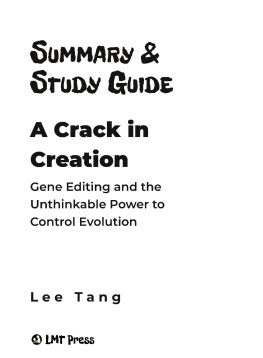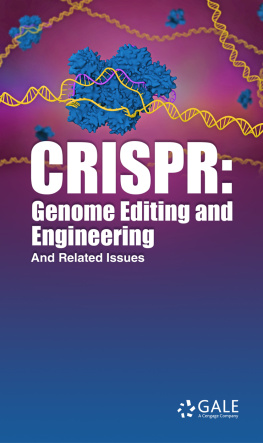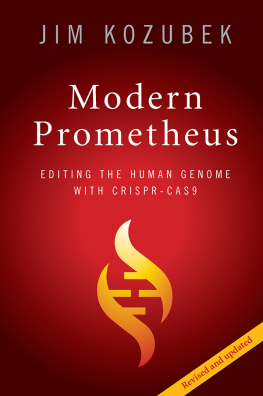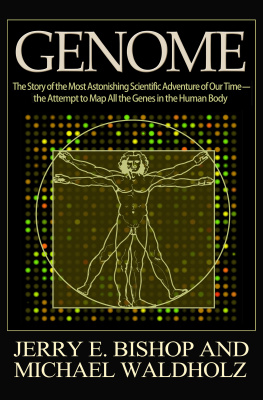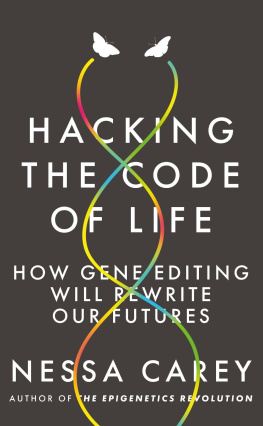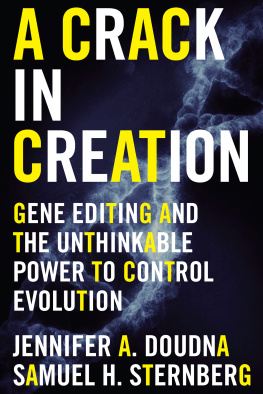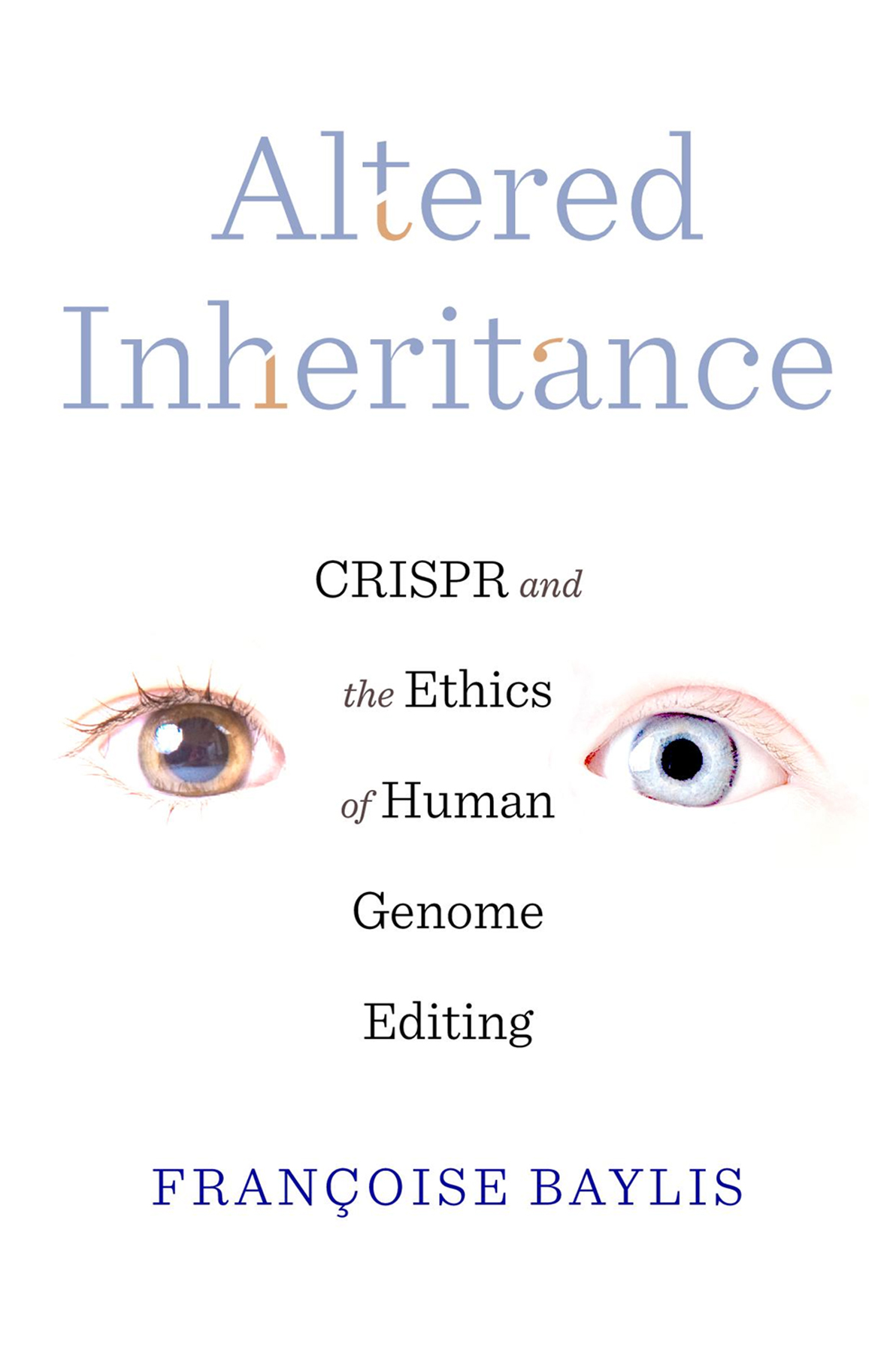Contents
Guide
Pagebreaks of the print version
FRANOISE BAYLIS
Altered Inheritance
CRISPR and the Ethics of Human Genome Editing


Cambridge, Massachusetts
London, England 2019
Copyright 2019 by the President and Fellows of Harvard College
All rights reserved
Many of the designations used by manufacturers and sellers to distinguish their products are claimed as trademarks. Where those designations appear in this book and Harvard University Press was aware of a trademark claim, then the designations have been printed in initial capital letters.
Cover design: Tim Jones
Cover image: Getty Images
978-0-674-97671-9 (alk. paper)
978-0-674-24196-1 (EPUB)
978-0-674-24197-8 (MOBI)
978-0-674-24195-4 (PDF)
The Library of Congress has cataloged the printed edition as follows:
Names: Baylis, Franoise, 1961 author.
Title: Altered inheritance : CRISPR and the ethics of human genome editing / Franoise Baylis.
Description: Cambridge, Massachusetts : Harvard University Press, 2019. | Includes bibliographical references and index.
Identifiers: LCCN 2019009524
Subjects: LCSH: Gene editingMoral and ethical aspects. | CRISPR (Genetics) | Genetic engineeringRisk assessment. | Medical ethics.
Classification: LCC QH438.7 .B38 2019 | DDC 576.5dc23 LC record available at https://lccn.loc.gov/2019009524
TO MY PARENTS, Richard and Gloria Baylis, who taught me about courage and integrity
Contents
O, wonder!
How many goodly creatures are there here!
How beauteous mankind is! O brave new world,
That has such people int!
W ILLIAM SHAKESPEARE, T HE T EMPEST
Over the years, the unthinkable has become conceivable.
Today we sense that we are close to being able to alter human heredity.
Now we must face the question:
How, if at all, do we as a society want to use this capability?
DAVID BALTIMORE, INTERNATIONAL SUMMIT ON HUMAN GENE EDITING
I was at the airport in Montral waiting for my connection to Toronto, en route to a CRISPR (pronounced crisper) genome editing workshop. The workshop, hosted by the ArtSci Salon, featured Portuguese bio-artist Marta De Menezes. Her thought-provoking visual art invites audiences to ask and answer the question What is nature? De Menezes is perhaps best known for her work in modifying the eyespot patterns in the wings of live butterflies solely for artistic purposes.
Deep in conversation with a friend about the upcoming workshop, I failed to notice a young man sitting across from us, listening, until he interrupted us to ask me what I did for a living. I explained that I am a university professor who studies ethical issues related to human reproduction and genetics. In turn, I asked him why he was interested in our discussion. He told me that he listens to Joe Rogan podcasts and that there had been an episode on CRISPR genome editing. He thought CRISPR was our salvation. I was taken aback. In my experience, few ordinary citizens have heard of CRISPRthe acronym for clustered regularly interspaced short palindromic repeats.Moreover, when I have briefly explained the science and ethics of CRISPR genome editing to family, friends, and colleagues, most have expressed concerns about designer babies.
I told the young man who later introduced himself as Justin that I had never heard of Joe Rogan. Justin was more than a little surprised to learn this. He told me that I really should listen to The Joe Rogan Experience. He was sure that I would learn a lot. Justin told me of his interest in human enhancement and his hope that we humans clustered regularly interspaced short palindromic repeats might one day be immortal. Why? I asked, to which he responded: Who wouldnt want to live forever? Why die if you dont have to? Why take a chance on finding out that there is nothing out thereon the other sidein which case there is no reason for us to be here? Justin firmly believed that if scientists could use genetics to forestall the physical decline and mental deterioration typically associated with aging, then living forever would be great.
In the days following our conversation, I reflected on Justins interest in human enhancement and, more specifically, his interest in immortality (which isnt exactly among the promises of CRISPR technology). While I could appreciate his interest in living better, I couldnt quite understand his interest in living longer and possibly living forever. Why would anyone want to live forever? From my perspective, part of what makes life precious is the fact that it is finite. We have only so much time in which to experience the world.
In an effort to better understand Justins perspective, I went looking for Joe Rogans CRISPR podcast. I found one from November 2017 titled Joe Rogan on CRISPR Changing DNA with guests Krystyna Hutchinson and Corinne Fisher (fellow comedians):
JOE ROGAN: They are starting to experiment with this new method of altering DNA. They are figuring out a way to do it with nonviable human embryos and they are starting to do it now with humans now that are alive This technology is not going to just change the way you look, itll literally change who you are. Its going to stretch your legs out. Its going to change your features They think they are going to be able to knock out Alzheimers. They are going to be able to stop a lot of the genes that allow people to have Parkinsons, and a lot of different ailments that people have. They have isolated those genes and they think they can shut them off.
KRYSTYNA HUTCHINSON: Wow. Thats good, but I also think that I dont want to live to be 150.
JOE ROGAN: You might be able to though. This is what is going to get really weird. You might not want to and you might say that, but maybe if youre eighty and someone says, Hey you want to be thirty again? You might go wow.
CORINNE FISHER: If I was in good health I wouldnt mind it.
JOE ROGAN: It might physically be possible for you to not just look thirty but be thirty. Like literally change your cellular structure to the point where youre a young person.
KRYSTYNA HUTCHINSON: And thats going to be the destruction of our society.
As I listened to this exchange, I was encouraged to hear ordinary people seriously discussing the big picture of human genome editing without getting bogged down in the details. At times, too, I found myself wanting to join the conversation. For example, I wanted to ask Joe to explain what he meant when he said that CRISPR could literally change who you are. And I wanted Krystyna to expand on what she saw as the long-term disruptive potential of CRISPR genome editing technology. In addition to asking questions of the host and his guests, I would have liked to expand the conversation by introducing a range of alternative perspectives that listeners might consider in reaching their own opinions about the ethics of human genome editing (also called human gene editing).
Listening to this podcast provided further impetus for this booka book that aims to bridge the divides between theory, science, politics, and practice in a manner that is engaging, widely accessible, and potentially influential; a book that aims to empower others by introducing them to novel perspectives and inviting them to critically examine arguments both for and against heritable human genome editing. In my view, everyone should have a say in whether modifying our genes and the genes of our descendants is something we should do.


